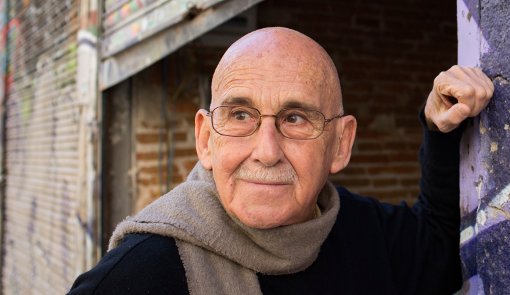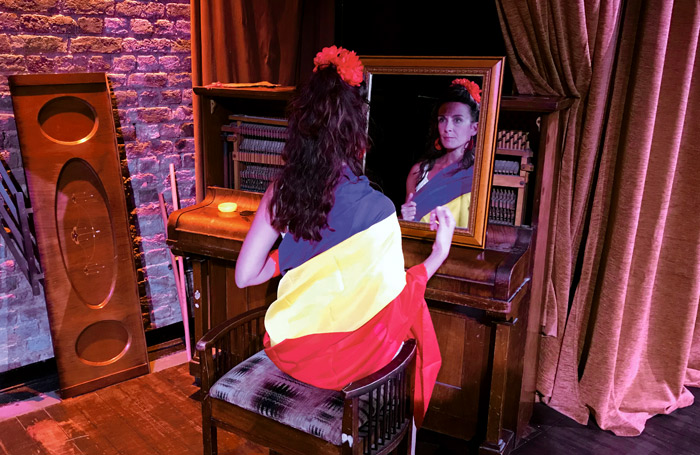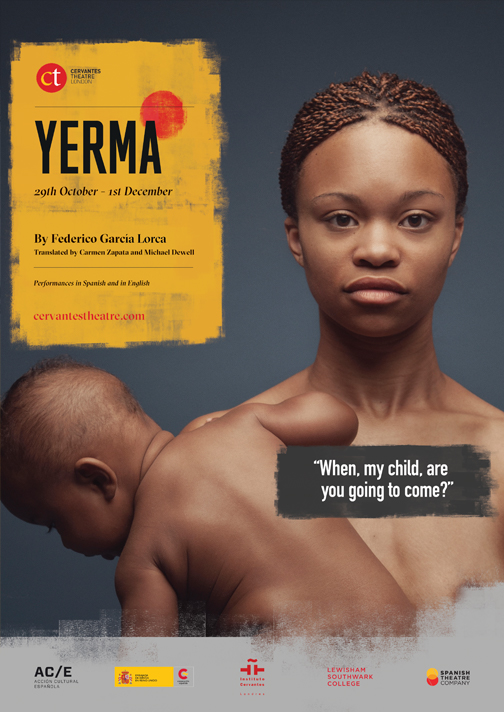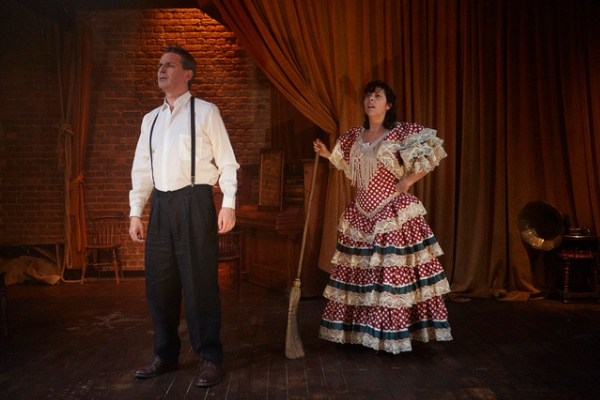The charming Cervantes Theatre is about to celebrate its second anniversary since its inauguration in November of 2016. Created by the Spanish Theatre Company (STC) and led largely by its Artistic Director Jorge de Juan, (and co-founder Paula Paz), they have staged a series of compelling and interesting productions. Having opened with the first of Federico Garcia Lorca’s Rural Trilogy, ‘Blood Wedding’, (directed by Jorge de Juan), the production set a standard that has been carefully maintained, followed as it was by The House of Bernarda Alba (second in the trilogy) earlier this year. This production was so successful that they had to extend its run considerably. Now we keenly await the last of Lorca’s Rural Trilogy which is ‘Yerma’ which is due to open on October 29th 2018. All these productions are presented in both English and Spanish versions.
Last year saw highlights like ‘Darwin’s Turtle’ (by Juan Mayorga) with its wonderful black humour competing well with the recent run of ‘Ay, Carmela!’, also overflowing with humour and intrigue, that has just come to an end.
This play ‘Ay, Carmela!’, written by award winning Spanish playwright José Sanchis Sinisterra in 1987, is part of what is known as his ‘Escenario Vacío’ (Vacant Stage) Trilogy. The bare stage sets a backdrop for the sharp, vivid, intercut, very funny and powerful dialogue, with all its colourful vulgarisms and colloquialisms, which is clearly one of Sanchis Sinisterra’s distinct fortes. No doubt this was a serious challenge for the translator John London, who did a remarkable job as the humour and wit is not lost at all. Ay, Carmela! was also made into a successful film by Carlos Saura and is the most popular of Sanchis Sinisterra’s works.

José Sanchis Sinisterra
Sanchis Sinisterra deliberately designed his trilogy to be as minimalist as possible, so that it could travel easily and be shown everywhere. Paula Paz has directed this play with a fine eye for detail and timing, so that the audience are never confused as the play shifts back and forth, from the present into flashback, effectively aided by the careful lighting.
'Ay, Carmela!’ is set during the Spanish Civil war. Carmela and Paulino, two hapless travelling Vaudeville entertainers accidentally find themselves on the wrong side of the divide, having strayed into fascist territory when they end up in the little village of Belchite, in the province of Zaragoza, Aragon, that has just been ‘liberated’ from the reds. (By the way, the remains of this very real village have been used as locations by directors Guillermo del Toro in ‘Pan’s Labyrinth’, as well as by Terry Gilliam in ‘The Adventures of Baron Munchhausen’.)
In order to ingratiate themselves and survive, Carmela and Paulino, to Carmela’s chagrin, find they have to pretend a different allegiance and reluctantly accept the request to put on a show for the fascist army and their prisoners, who, they discover, are to be executed the following day. Distressed and confused by their dire situation, Carmela and Paulino try to rehearse their music, fragments of flamenco dances and magic, while constantly bickering and disagreeing on just about everything.

Madalena Alberto as Carmela
But then, is Carmela dead? Is she there or is she not there? Despite the dark comedy and hilarious developments, this play is really about the futility of war and how survival instincts are not always shared and the inevitable grief that is engendered. Very sad and very funny all at once, this play is held together by the two actors, who hold the stage for two hours and carry the audience with them throughout. Paulino is so terrified he begins to lose his voice and Carmela is furious she has been landed with a dress that is far too big! Carmela is the star, always brave, magnificent and wilful, flirting with danger, all the while aggravating Paulino’s concern, as he is determined to come out on top, no matter what, deciding early on that to ingratiate himself will be the best solution.
The bare stage, empty but for some mist, light effects and mystery, is never found wanting, as the audience fills in the absent elements, including the army, the guard and the condemned prisoners. Carmela and Paulino dance and act out their fears, each in their own way, and we empathize, desperately feeling we are also falling, with them, into ever more precarious situations.

Paula Paz
The director Paula Paz selected her cast very carefully: -
“I have been tremendously lucky. They are all great actors. The Spanish cast (Sofia Monreal and Jorge Lucas) are now back in Spain, from whence they came, to take part in this play. Sofia Monreal lived in London for a few years and that is how we got to know her, through the Spanish Theatre Company, before this theatre had been inaugurated. We worked with her on various dramas and were looking forward to working with her again, now that the new theatre is finally open. We met Jorge Lucas through Sofia Monreal and he is an actor with ample experience in Spain, like Sofia. They have not only worked in the theatre, but they have also done a lot of television. They both worked on a very successful series in Madrid together called: Yo soy Bea. (Ugly Betty).”
When there are two language versions of a production, it is interesting to see how some dynamics change, as clearly language has a power of its own. In the English version Carmela (Madalena Alberto) comes across as determined and strong, more pensive and thoughtful, whereas in the Spanish version, she is wilder and more of a loose cannon. In similar ways, the English version of Paulino, (Ivanhoe Norona), seems to suffer more distress and is less ingratiating than Jorge Lucas in the Spanish version. Both are equally absorbing, emotional and funny, so the subtle variations elicit slightly different emotional responses from the audiences.
Ay, Carmela! has been so successful that Paula Paz is seriously planning to find a way to give it a second run: -
“The play has been very well received… we’re planning to bring it back because it was sold out every night, especially the Spanish version, but due to previous commitments, the actors were unable to extend and stay longer, so we’ll do it at another time and, possibly, take it on tour. We’ve never done tours before, but we’re keen to start and we think that ‘Ay, Carmela!’ is the right choice of play for this. We know that there’s a lot of interest in Spain and here in the UK, there’s also been interest from Manchester and Bath, for instance.”
A slight shadow hangs over the Theatre in that it has been created out of a railway arch in Southwark and Network Rail has decided to sell thousands of its railway arches as part of a £1.5bn property deal. Despite vowing that businesses working in the arches will not be adversely affected, the sale has sparked anxiety among tenants, that also include independent shops, garages and craft breweries to mention a few, as they are concerned that the new owners (Terereal Trillium and Blackstone Property Partners) might decide to impose unaffordable rent rises.
Paula Paz states that, so far, they do not know if they will be affected. They are a registered charity and do not work for profit, so, for the moment, they trust that all will be well. But nothing stops for long at the theatre: -
“Here, we never rest! We have now started the rehearsals for Yerma that will be directed by Jorge de Juan, the Artistic Director and I am supporting him in production. We inaugurated [the Cervantes Theatre] with [Federico García Lorca’s] ‘Blood Wedding’, which was the first play we put on, and now, after The House of Bernarda Alba, we are presenting the last one ‘Yerma’.”
‘Yerma’ is a ‘tragic poem’ about a woman who is desperate to have a child and suffers the agony of infertility. Because of the social mores and traditions, she is driven to commit a terrible crime.
Ay, Carmela! played from Sept 24th – October 13th 2018
Yerma by Federico García Lorca and directed by Jorge de Juan (translated by Carmen Zapata and Michael Dewell) will open on October 29th and play till December 1st 2018.

More info & tickets: www.cervantestheatre.com
















